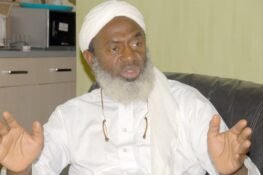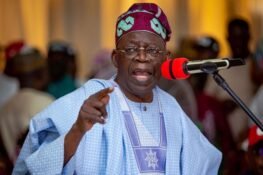This week, 59 white South African refugees landed at Dulles International Airport, marking the start of a controversial new refugee policy under President Trump.
The policy gives priority to Afrikaners, white South Africans of mainly Dutch and French descent, for resettlement in the United States.
White South Africans are being encouraged to apply as refugees and given a fast lane on the allegation by the US president, and his South-Africa-born ally, Elon Musk, that Afrikaners are being persecuted in Africa, and facing “genocide.”
This unusual move has sparked debate about racial bias in American immigration policy.
To Africans, Asians and South Americans being driven out of the United States by the same administration, white South Africans are receiving racially preferential treatment.
Other than the factor of race, it is difficult to explain why the Afrikaners received an extraordinary welcome. Deputy Secretary of State, Christopher Landau, personally greeted them, saying, “I want you to know that you are really welcome here.”
It is hard to reason contrary to the fact that Musk, who has significant influence in the Trump administration, wants to relocate his fellow Afrikaners to the United States
The government provided a chartered flight and fast-tracked their processing. These are rare protocol for refugees entering the United States.
The treatment stands in stark contrast to the experiences of other refugee groups, who often face years of screening and difficult arrivals.
Former presidential security adviser Michael Bolton said the idea of bringing in Afrikaner refugees “had been discussed before, but I never took it seriously.” He added, “Some random person tells him [Trump] something and he’s obsessed with it.”
At the centre of this policy shift is Elon Musk, the world’s richest man, political sponsor of President Trump.
It is hard to reason contrary to the fact that Musk, who has significant influence in the Trump administration, wants to relocate his fellow Afrikaners to the United States.
Experts question whether these Afrikaners meet the legal definition of refugees. Under international law, refugees must have a “well-founded fear of persecution” based on factors like race, religion, or political opinion.
The Trump administration claims Afrikaners face “unjust racial discrimination” in South Africa. However, statistics tell a different story about which groups are truly disadvantaged.
A white South African influencer, talking to BBC, disagreed. Mr. Ulrich Janse van Vuuren said: “They’ve enjoyed more than their share of South Africa’s resources and privileges, and none are fleeing racial persecution.”
In 2024, unemployment among white South Africans was just 7.9%, compared to 36.9% for Black South Africans.
White-headed households earned about R676,375 annually, while black-headed households earned only R143,632. White South Africans still own a disproportionate share of the country’s land.
Interestingly, the American President views white farmers in South Africa, who own more than 90% of the land and business, as victims of black Africans.
Introducing an obviously flawed policy for South Africa only has created diplomatic problems between the US, South Africa and the rest of the world.
The Trump administration first cut foreign aid to South Africa, claiming the country was targeting white Afrikaners with “race-based discrimination.”
Soon after, South Africa’s ambassador to the US, Ebrahim Rasool, was expelled after warning against a “global protective movement that is beginning to envelop embattled white communities.”
Rasool had argued that President Trump was “mobilizing supremacism” to “project white victimhood as a dog whistle” as the white population faced becoming a minority in the US.
US Secretary of State Marco Rubio responded angrily to these comments, leading to Rasool’s expulsion despite the backing of South African President Cyril Ramaphosa.
The welcoming of Afrikaner refugees comes at a time when the Trump administration has generally restricted immigration and cut refugee programs. Many see this as evidence of racial bias in US immigration policy.
Groups fleeing well-documented violence in Central America, Africa, and the Middle East have faced major obstacles in accessing the US asylum system.
Meanwhile, Afrikaners – who critics note are not facing systematic persecution – have been given special treatment to waltz into the US.
The US is simply telling the world that it values white people more than non-Whites who it wants to urgently exit.
To understand the controversy, it’s important to consider the historical contexts of racial discrimination in both countries.
In South Africa, the apartheid system (1948-early 1990s) was designed to ensure white dominance in all aspects of life.
Under apartheid, the Population Registration Act of 1950 classified all citizens by race.
Over 80% of land was reserved for the white minority.
The selective nature of South African experiment, particularly when contrasted with the historical and ongoing struggles against racial injustice within the U.S. itself, undermines its credibility
Black South Africans were confined to economically poor “Bantustans.” Movement was strictly controlled through pass laws. Black children received deliberately inferior education.
Though apartheid officially ended with the 1994 democratic elections, its effects continue to shape South African society today.
The United States has a similar history of racial discrimination, from slavery to Jim Crow segregation.
Though civil rights legislation in the 1960s aimed to dismantle legal segregation, systemic racism continues to affect American society in areas like criminal justice, wealth distribution, housing, education, and healthcare.
Under the America international refugee law, particularly the 1951 Refugee Convention, a refugee must have a “well-founded fear of being persecuted” and be unable to seek protection in their home country.
Critics argue that Afrikaners, as a group, do not meet this definition. While South Africa faces challenges, including high crime rates affecting all communities, but there is little evidence of systematic, state-supported persecution specifically targeting white South Africans.
Isolated incidents of crime or expressions of anti-white sentiment, while concerning, do not typically meet the legal threshold of persecution unless they form part of a systematic campaign that the state fails to address.
For many observers, especially those from African nations and minority communities, the special access to Afrikaners is deeply unjust. It seems to favor a historically privileged group while restricting access for non-white refugees facing documented persecution.
Critics see this as particularly offensive given that Afrikaners benefited from racial supremacy during apartheid and are now being framed as victims of racial discrimination.
The selective nature of South African experiment, particularly when contrasted with the historical and ongoing struggles against racial injustice within the U.S. itself, undermines its credibility.
The long-term effects of this policy could be significant.
It risks further polarizing American society, worsening racial tensions, damaging relationships with international partners, and undermining America’s credibility as a defender of human rights.
America is behaving in a manner that continues to erode its stature as a leader in upholding international legal and democratic principles.
The United States will have to stop cozying up to scoundrels to maintain its stature.








